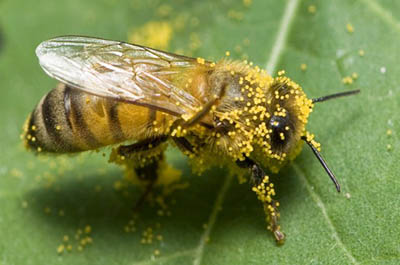Colorado’s incredible natural resources depend on pollinators – small animals like bees, moths, butterflies, hummingbirds, and bats that visit flowers to collect nectar, and in the process carry pollen between the plants to help them reproduce. Pollinators not only ensure the success of Colorado’s wildflowers but are also essential to our agricultural and food systems.
Unfortunately, pollinator populations are being threatened by destruction of natural habitat, use of chemicals like pesticides, and human-caused climate change. Because pollinators are so important, the state government has made it a priority to work together across departments to protect them. Here’s a look at a few of the ways the state of Colorado is protecting its pollinators.

Department of Natural Resources
Following a mandate from the Colorado General Assembly, the Department of Natural Resources worked with several universities and conservation organizations to publish a comprehensive study detailing the health of that state’s native pollinators. The study found that the status of Colorado pollinators was tenuous and recommended five actions for the government to take to protect vulnerable species:
- Priority 1: Protect imperiled native pollinating insects
- Priority 2: Protect, restore, and connect pollinator habitats
- Priority 3: Mitigate environmental changes that negatively impact pollinators and their habitats
- Priority 4: Reduce the risks from pesticides to pollinating insects
- Priority 5: Monitor and support native and managed pollinator health
General Assembly
In 2024, the Colorado General Assembly passed House Bill 24-1117, which added invertebrates to the list of species that can be studied and protected by Colorado’s Nongame, Endangered, or Threatened Species Conservation Act. This means that Colorado Parks and Wildlife has the authority and financial resources to protect invertebrate habitats and help vulnerable pollinator species recover. This bill fulfills one of the key recommendations in the Colorado Native Pollinating Insects Health Study mentioned above.
Department of Agriculture
Colorado’s food supply relies on pollinators to produce fruit and seeds, especially top agricultural exports like alfalfa and apples. To help protect our insect partners in food production, the Department of Agriculture adopted a State-Managed Pollinator Protection Plan (MP3). The MP3 provides guidance for food growers, beekeepers, and homeowners to support pollinator populations.
Department of Transportation
The Department of Transportation identified an opportunity to create pollinator-friendly landscapes along Colorado’s thousands of miles of highway. They adopted a Pollinator Habitat Enhancement Plan in 2020, which directs the department to establish native plant communities along the state’s highways and reduce intensive roadside mowing and pesticide applications. The Colorado legislature and CDOT also worked together to establish Interstate 76 as Colorado’s Pollinator Highway (link opens to a video).
Coloradans
Colorado citizens can also help create a healthy habitat for pollinators! Check out the links below for information from Colorado State University on creating pollinator-friendly landscaping and supporting the Native Bee Watch project.
- Creating pollinator habitat
- Feeding Honey Bees In Colorado
- Creating Pollinator Habitat
- Native Bee Watch citizen science field guide
- Colorado state parks: St. Vrain - August 8, 2025
- Peach production in Colorado - July 25, 2025
- Colorado’s Governors: Ralph L. Carr - July 11, 2025